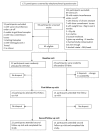Energy Restriction Enhances Adult Hippocampal Neurogenesis-Associated Memory after Four Weeks in an Adult Human Population with Central Obesity; a Randomized Controlled Trial
- PMID: 32121111
- PMCID: PMC7146388
- DOI: 10.3390/nu12030638
Energy Restriction Enhances Adult Hippocampal Neurogenesis-Associated Memory after Four Weeks in an Adult Human Population with Central Obesity; a Randomized Controlled Trial
Abstract
Adult neurogenesis, the generation of new neurons throughout life, occurs in the subventricular zone of the dentate gyrus in the human hippocampal formation. It has been shown in rodents that adult hippocampal neurogenesis is needed for pattern separation, the ability to differentially encode small changes derived from similar inputs, and recognition memory, as well as the ability to recognize previously encountered stimuli. Improved hippocampus-dependent cognition and cellular readouts of adult hippocampal neurogenesis have been reported in daily energy restricted and intermittent fasting adult mice. Evidence that nutrition can significantly affect brain structure and function is increasing substantially. This randomized intervention study investigated the effects of intermittent and continuous energy restriction on human hippocampal neurogenesis-related cognition, which has not been reported previously. Pattern separation and recognition memory were measured in 43 individuals with central obesity aged 35-75 years, before and after a four-week dietary intervention using the mnemonic similarity task. Both groups significantly improved pattern separation (P = 0.0005), but only the intermittent energy restriction group had a significant deterioration in recognition memory. There were no significant differences in cognitive improvement between the two diets. This is the first human study to investigate the association between energy restriction with neurogenesis-associated cognitive function. Energy restriction may enhance hippocampus-dependent memory and could benefit those in an ageing population with declining cognition. This study was registered on ClinicalTrials.gov (NCT02679989) on 11 February 2016.
Keywords: adult hippocampal neurogenesis; ageing; cognition; energy restriction; intermittent fasting; pattern separation; randomized controlled trial; recognition memory.
Conflict of interest statement
The authors declare no conflict of interest. The funders had no role in the design of the study; in the collection, analyses or interpretation of data; in the writing of the manuscript, or in the decision to publish the results.
Figures


Similar articles
-
Increasing adult hippocampal neurogenesis is sufficient to improve pattern separation.Nature. 2011 Apr 28;472(7344):466-70. doi: 10.1038/nature09817. Epub 2011 Apr 3. Nature. 2011. PMID: 21460835 Free PMC article.
-
Intermittent energy restriction is comparable to continuous energy restriction for cardiometabolic health in adults with central obesity: A randomized controlled trial; the Met-IER study.Clin Nutr. 2020 Jun;39(6):1753-1763. doi: 10.1016/j.clnu.2019.07.014. Epub 2019 Jul 30. Clin Nutr. 2020. PMID: 31409509 Clinical Trial.
-
Effects of Caloric Restriction on Spatial Object Recognition Memory, Hippocampal Neuron Loss and Neuroinflammation in Aged Rats.Nutrients. 2023 Mar 24;15(7):1572. doi: 10.3390/nu15071572. Nutrients. 2023. PMID: 37049417 Free PMC article.
-
Targeting Adult Neurogenesis to Optimize Hippocampal Circuits in Aging.Neurotherapeutics. 2017 Jul;14(3):630-645. doi: 10.1007/s13311-017-0539-6. Neurotherapeutics. 2017. PMID: 28536851 Free PMC article. Review.
-
Adult hippocampal neurogenesis and cognitive flexibility - linking memory and mood.Nat Rev Neurosci. 2017 Jun;18(6):335-346. doi: 10.1038/nrn.2017.45. Epub 2017 May 4. Nat Rev Neurosci. 2017. PMID: 28469276 Free PMC article. Review.
Cited by
-
Dietary Restriction against Parkinson's Disease: What We Know So Far.Nutrients. 2022 Oct 3;14(19):4108. doi: 10.3390/nu14194108. Nutrients. 2022. PMID: 36235760 Free PMC article. Review.
-
The 5:2 diet does not increase adult hippocampal neurogenesis or enhance spatial memory in mice.EMBO Rep. 2023 Dec 6;24(12):e57269. doi: 10.15252/embr.202357269. Epub 2023 Nov 21. EMBO Rep. 2023. PMID: 37987211 Free PMC article.
-
Intermittent Fasting: Potential Bridge of Obesity and Diabetes to Health?Nutrients. 2022 Feb 25;14(5):981. doi: 10.3390/nu14050981. Nutrients. 2022. PMID: 35267959 Free PMC article. Review.
-
The dynamic influence of nutrition on prolonged cognitive healthspan across the life course: A perspective review.Neurosci Appl. 2024 May 6;3:104072. doi: 10.1016/j.nsa.2024.104072. eCollection 2024. Neurosci Appl. 2024. PMID: 40656107 Free PMC article. Review.
-
Feasibility and acceptability of time-restricted eating in a group of adults with multiple sclerosis.Front Neurol. 2023 Jan 12;13:1087126. doi: 10.3389/fneur.2022.1087126. eCollection 2022. Front Neurol. 2023. PMID: 36712417 Free PMC article.
References
Publication types
MeSH terms
Associated data
Grants and funding
LinkOut - more resources
Full Text Sources
Medical

